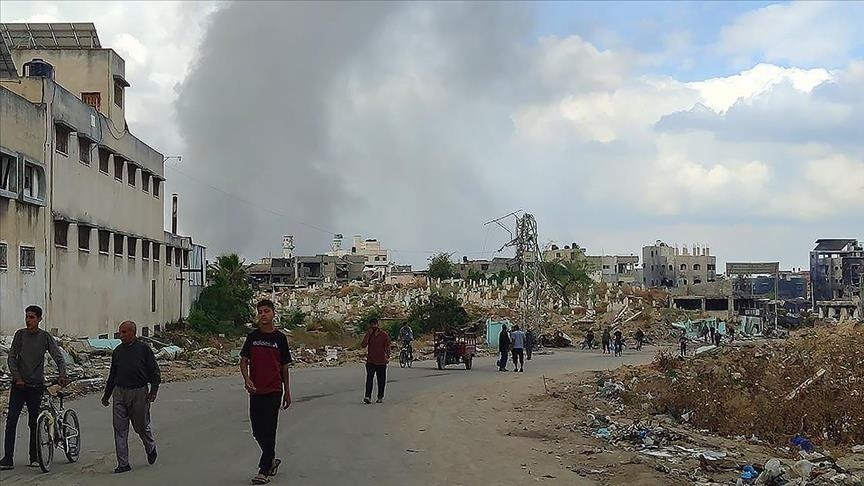UN warns ‘all humanitarian aid could stop in few days’ in Gaza
‘Everything runs on fuel and unless that situation changes, we only have 2-3 days until all humanitarian operations will come to halt,’ says spokesperson of UN humanitarian office in Gaza

GENEVA
Everything in Gaza runs on fuel and if the current situation does not change soon, all humanitarian aid could stop in just two or three days at most, according to a UN official.
Olga Cherevko, the spokesperson of the UN humanitarian office in Gaza, told Anadolu about the latest situation in Gaza and humanitarian aid efforts.
The situation in Gaza, which is under intense Israeli attacks, continues to be “catastrophic” and is worsening day by day, she said, noting that more than 450,000 people are estimated to have left after the Israeli army demanded the evacuation of Palestinians living in Rafah on May 6.
She said areas previously full of shelters and those in the southern part of Gaza are now without any inhabitants.
The UN official stressed that many of those who flee from Rafah go to al-Mawasi and Khan Younis areas, as well as the central parts of Gaza, adding: “They're running away with all of their belongings. They pick up, gather whatever they have, which is already so minimal.”
She also said the conditions in the places where Palestinians live and where they have to go are “so terrible” that “it's difficult to put into words, to be honest.”
No sanitation, no food, no shelter
There is no sanitation, food, or shelter in the places to which people flee from Rafah, Cherevko stressed, adding that they were unable to bring in humanitarian supplies due to the closure of the borders into the strip and that they were very concerned about the lack of humanitarian aid supplies.
She noted that most of Gaza's infrastructure has been destroyed, and less than a third of the hospitals in the region can provide partial services and none of them can serve at full capacity.
The official also said the available humanitarian aid supplies are sufficient for only a very short period of time and people do not have the strength to cope with the situation.
“These people have been displaced six, seven, eight or more times, and they’re running away once again, in search of safety,” she lamented. “There is no safe place in Gaza.”
Cherevko noted that after the closure of the Rafah border crossing by the Israeli army on May 6, the flow of humanitarian aid into the strip has completely stopped, emphasizing that the very limited aid entering through the Kerem Abu Salim (Shalom) border crossing is not sustainable and sufficient.
Following the closure of the Rafah border crossing, around 2,000 trucks loaded with aid are stranded, unable to enter Gaza through this route, she said.
Our supplies are running critically low, posing a significant danger, particularly for vital infrastructure like water systems, which can be irreparably damaged without proper maintenance, the official stressed.
She further urged the immediate reopening of these border crossings and a substantial increase in the flow of humanitarian aid into Gaza, emphasizing that even before May 6, the quantity of aid entering Gaza was insufficient to meet the needs of the population.
Stressing how difficult it is to enable the entry of fuel into the region, she said: “Everything runs on fuel and unless that situation changes, we only have two-three days until all humanitarian operations will come to a halt,” she warned.
Last week, the Israeli forces launched a ground attack in Rafah, where more than 1.5 million displaced Palestinians have sheltered, and also captured the Palestinian side of the Rafah crossing, a vital route for humanitarian aid and the territory’s only gateway to the outside world.
Israel has waged a brutal offensive on the Gaza Strip in retaliation for an Oct. 7, 2023, Hamas attack, which killed 1,200 people.
More than 35,100 Palestinians have since been killed in Gaza, mostly women and children, and over 79,000 others injured, according to Palestinian health authorities.
In the West Bank, nearly 500 Palestinians have been killed and thousands injured since Oct. 7, along with daily arrest campaigns by the Israeli army.
Israel stands accused of “genocide” at the International Court of Justice, which has ordered Tel Aviv to ensure its forces do not commit acts of genocide and take measures to guarantee that humanitarian assistance is provided to civilians in Gaza.
*Writing by Merve Berker in Ankara
Anadolu Agency website contains only a portion of the news stories offered to subscribers in the AA News Broadcasting System (HAS), and in summarized form. Please contact us for subscription options.







